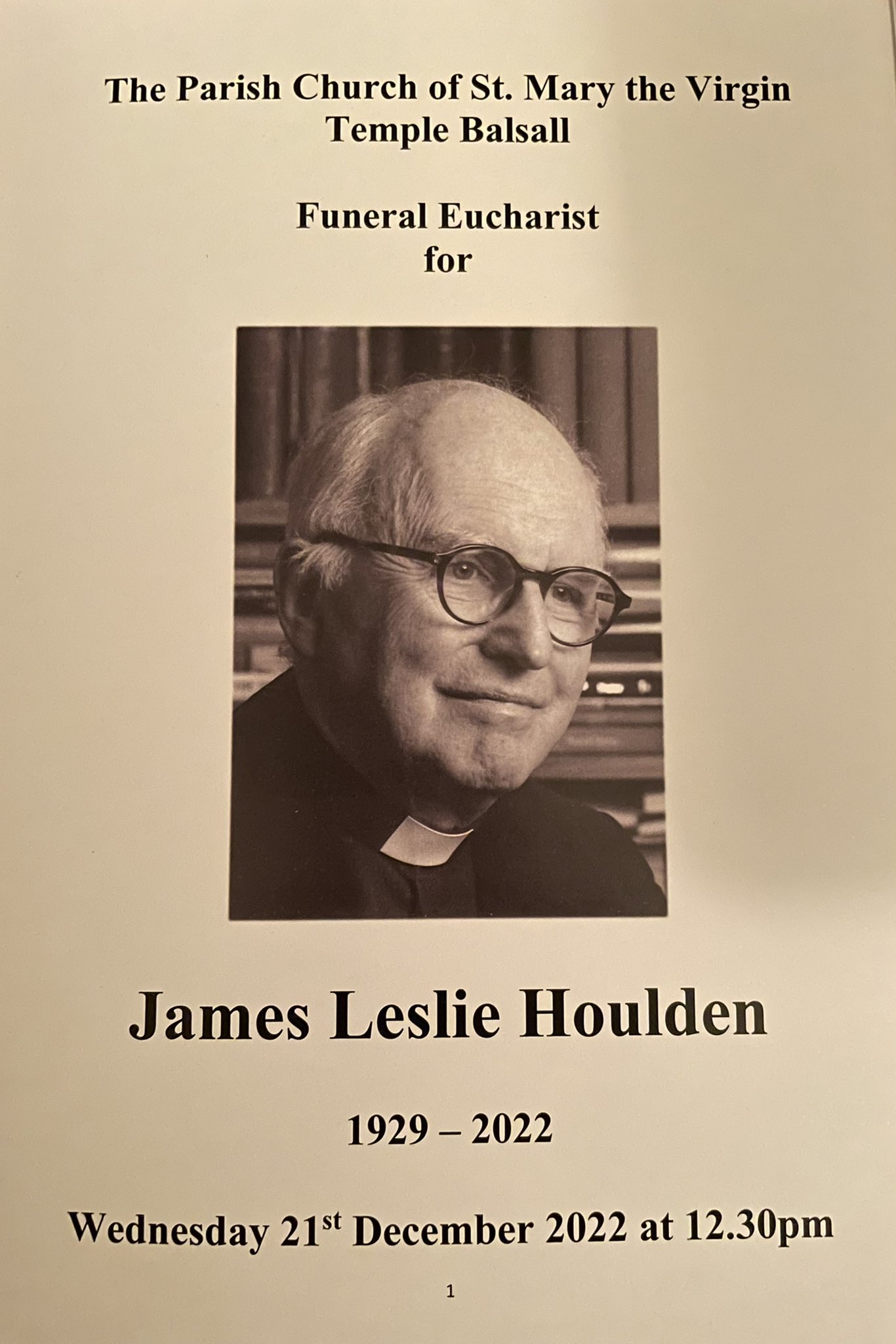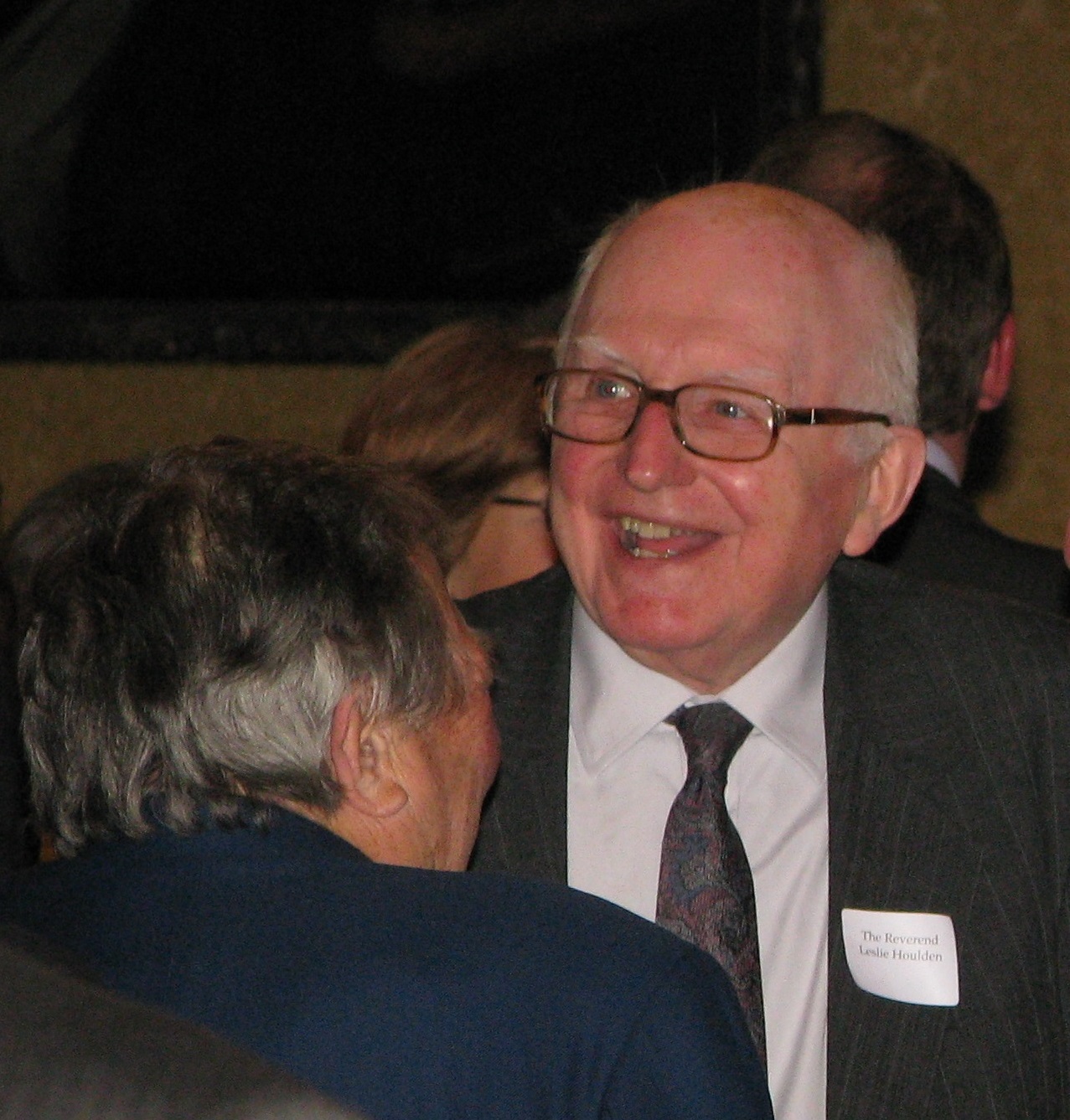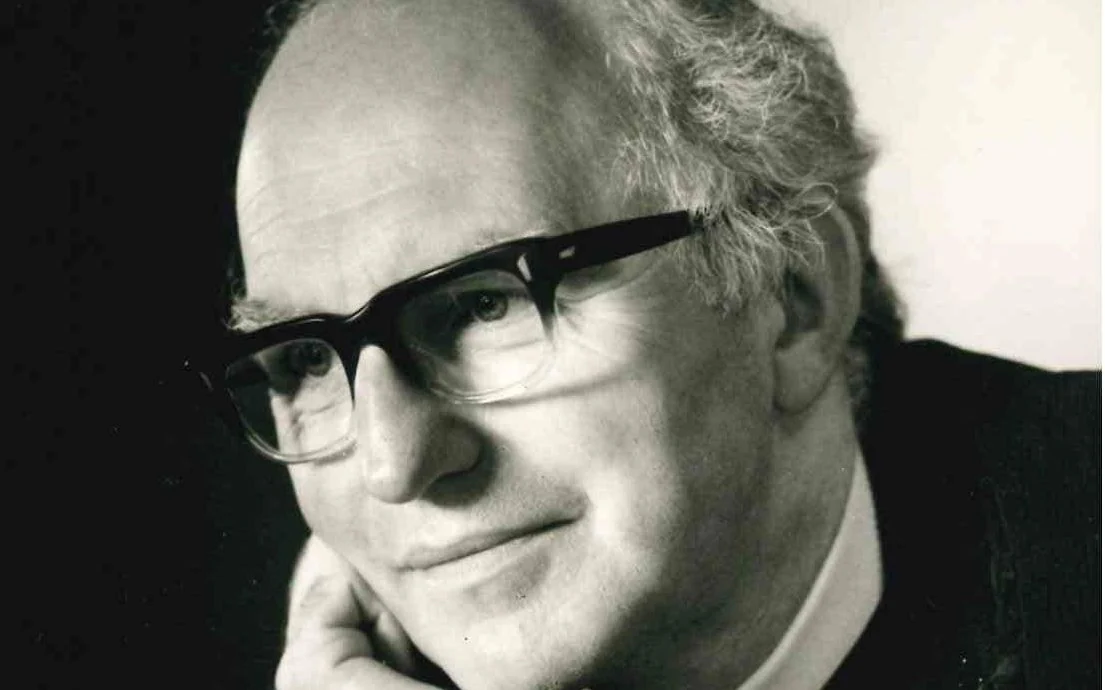A Sermon delivered at the Funeral Eucharist of Leslie Houlden at the Parish Church of St Mary the Virgin Temple Balsall
21st December 2022 at 12.30pm
Leslie left clear and detailed instructions for his funeral. From time to time, they were updated – always with the heading: LH Funeral – no date assigned. It was his wish that I should preside and preach at this Eucharist and the directions were characteristically practical and clear. Under sermon, he wrote
‘10 to 15 minutes and no flannel’. So, I shall do my best!
In our first reading, used within the lectionary for Eastertide, the resurrection of Jesus Christ signals the Lordship of God over all creation, and all time. We see and feel through the striking and beautiful depiction of the aftermath of God’s final victory, the blessing that enables God’s people to live in God’s very presence. Leslie wrote this about the passage: ‘in God’s presence, all separation is finally over. God is one and the same in the beginning and the end. We are encouraged as God’s people to faithfulness and endurance’. [i]
In the Gospel reading, the story of Zacchaeus was described by Leslie as “Luke’s masterpiece” In this church we remember how Leslie broke open the text of Scripture to trace many colourful connections in his short and beautifully crafted sermons. His poetic grasp of truth was profound. I remember him reminding this congregation that the key phrase in this piece is ‘today salvation has come to this house’. We live out our faith in the immediacy and ordinariness of the now – this is the crucible of our experience of salvation. And what might that mean? That we like Zacchaeus, should be people of hospitable friendship. We should live for joy and do whatever we can to work for restoration, equality, and justice. We should be seekers with a special heart for the lost.[ii]
It is within the context of this Eucharist that we meet to remember Leslie. His request for the inscription for the slate that will mark his grave is simple. It offers us three themes of his life through which we meet to celebrate, remember him with gratitude.
They are in the Latin: Sacerdos, amator Dei, and Quaerēns which translated are (of course) priest, lover of God and questing or searching. Let’s reflect on these three aspects of Leslie for a moment:
Leslie the Priest.
Leslie Houlden was the kind of priest the English like – friendly to everyone, but not in the least pushy, intelligent but more interested in your view than his own. He was a careful listener, the mark of a good teacher. He was never an academic without being a pastor or a pastor whose intellect played no part in his human dealings. In this mode, Leslie was a faithful priest to many congregations: Hunslet in Leeds, Chichester, Trinity College, Oxford, Cuddesdon, and while in London especially to the community of St John’s, East Dulwich. He never failed to preach, preside, and pastor with the utmost seriousness and these ministries were offered in rich and varied ways. He was faithful in prayer. He sought to lift hearts and minds to God in private and in public. His communication of the Gospel was always deeply considered and carefully expressed. There was rarely a word out of place.
In a sermon at my first celebration of the Eucharist. Leslie captured his vision of the shape of priesthood in this way:
‘Priests are meeting points, where groups and individuals otherwise divided or scattered, can reckon to come together and find connection and peace. Just think how the priest in their congregation, just by being there, holds together all sorts of people who, if it weren’t for their shared faith, wouldn’t dream of associating with each other. The priest is a special kind of meeting point that shows us the amazing, gracious character of God – who dares us to accept his call and share his love wherever we go’ [iii]
Many have expressed the impact of Leslie’s priesthood on them, especially those whose chaplain and teacher he was at Trinity Oxford. Here is a flavour of his priestly work:
‘My recollection (is) of a gentle, discreet, and sensitive soul, always able to see through human pretences but never (with a) cynical eye. Hospitable and entertaining, he widened the horizons of the Trinity students in his care. The Borstal camps set me onto a career in the Probation Service.’ [iv]
There are many in this community that are grateful to Leslie for his ministry. In correspondence Leslie said this about being here, ‘the church community associated with St Mary’s is an ideal example of a gentle yet active Christian life.’[v]
Leslie the lover of God
Leslie belonged to a group of scholars who combined deep roots in Catholic liturgy and piety, with a critical approach to the bible. He was never satisfied with easy answers and could probe with uncompromising questions. His work on the collected sermons of Austin Farrer, whom he succeeded at Trinity, is an important legacy. He did much to promote the intellectual curiosity of Farrer, combined as it was with a disciplined life of prayer. Leslie inhabited this tradition. Breakfast – or later in the day, sherry, was never taken until he had said the daily office. His Greek New Testament often left open with a note to follow up a bit of history or exegesis.
Yet, religion for Leslie was the common possession of all human beings – of those who are aware enough to stand amazed before the beauty and mystery of God. For Leslie this fostered a deep gratitude which was constant and spilled over in his relationships. Many here will have a collection of thank you notes and cards from him. Our gratitude is due to this place and community. Thanks to all the staff for their care especially in his latter frail years. To Mary Little and Jen Jones for their friendship. Gratitude was rooted in a fundamental truth – the reality of our acceptance in Christ.
Leslie’s Christian devotion could be seen in the Thursday morning Eucharist where the congregation was made up of a range of residents. Leslie’s role in this short Eucharist was to simply to play the piano for our two hymns which he did with gusto. Leslie inhabited the moment attentive to those present. We saw his devotion and attentiveness. Again, in Leslie’s words, ‘the basic colouring of my life by Jesus, the one who was both close and distant is formed by attention to those four little Gospel books, not by shifting personal sentiment or preference, plucked out of the air one has come to breathe into the self, one has turned out to be, fragile, failing, but always hoping for movement and redefinition in the midst of which we all live our lives’[vi]
Leslie the Quester
Leslie would often tell the story of Austin Farrer, who was now Warden of Keble, telephoning him to inform him that he was on his way over to Trinity to see him. In Leslie’s words, ‘Austin came in and wandered round my bookshelves in silence. Then he turned and looked me in the eye. ‘You seem to think’ he said, ‘that books are to be bought and read. I think that they are to be written and sold’. And he left. Leslie adds that Farrer’s words changed the course of my life.[vii]
Leslie’s lifelong quest for truth, for knowledge, for making connections, is to be found in his books. His early writing, Paul’s Letters from Prison[viii] and The Pastoral Epistles [ix]are still in print and valuable examples of Leslie’s meticulous attention to the historical detail of the world of New Testament. Remarkably, his book, Ethics and the New Testament is still widely used. In 1997 his short essay in The Myth of God Incarnate was published amidst some controversy. My own favourite book of Leslie’s is Backward into Light, which explores the passion narratives of Mark and Matthew which sprang from Holy Week lectures.
Alongside his teaching across the country to a variety of groups, Leslie continued to write, which included many incisive book reviews and through this he made a significant contribution to the life and work of British theology in the latter Twentieth Century. His final work, was an encyclopaedia of the life, times, and influence of Jesus, published in 2005 and entitled Jesus, the Complete Guide.[x] In it he invited and edited the work of a large range of first-rate international scholars, adding thirty-four entries of his own.
Leslie, the quester was awarded a Lambeth Doctor of Divinity by Archbishop Rowan Williams in 2015. The citation reads ‘In recognition of his contribution to New Testament scholarship as a lecturer and theologian, who has sought in many of his numerous books and articles to revisit the expression of Christian doctrine in the light of modern New Testament studies.’[xi] I think it is fair to say that his words and wisdom live on in us and his readers.
Of course, many of us will have encountered Leslie the priest, lover of God and quester, through his generous hospitality. At an Athenaeum lunch, I asked him what he thought his legacy might be. Thirty six hours after the question I received a classic Houlden letter, ‘I think you might have been asking whether anything I have written is or has been much good. My honest answer is no – it is all workaday, derivative, nonoriginal – though the style might be considered by some as often attractive. What I’ve done is to try to make faith and critical faith, commendable in our present time and culture.’
Perhaps this is a harsh judgement on his own work. I would describe him as a poetically minded historian who believed that a modest sense of poetry would liberate us from many foolishnesses. He never believed that theological education was only a means of self-improvement, but always an aspect of the love of God, for which we are created. He recalls that after his first New Testament essay in 1953, his tutor told him that he should always bear in mind that you couldn’t understand the New Testament unless you were on the side of the revolution. And in Leslie there was a radical who took risks and who turned over many tables in search of truth.
Leslie was indefatigable in reminding Church and academy of the critical relationship between New Testament studies to the development of modern theology. This is most obvious in his work on interpretation. Leslie was one of the two editors (alongside Richard Coggins) of the much-acclaimed Dictionary of Biblical Interpretation.[xii] It was also Leslie who helped edit the document on the Interpretation of Scripture produced by the Roman Catholic Pontifical Biblical Commission. [xiii] Both these initiatives have added a new dimension to New Testament exegesis and hermeneutics. His concern for integrity within theology is manifest throughout his life and work.
I end with the final verse of a poem that was one of Leslie’s favourite pieces. He wrote a stunning final chapter in his book Connections: Integration of Theology and Faith which remains important as today’s church negotiates an ever-uncertain geography.[xiv] I think it sums up the man and the priest, the lover of God and the quester. It is from William Plomer,[xv]
Everything bends
to re-enact
the poem lived,
the poem spoken
by Christ, who never
wrote a word,
saboteur
of received ideas
who rebuilt Rome
with words he
never wrote;
whether sacred,
whether human,
himself a sunrise
of love enlarged,
of love, enlarged.[xvi]
And into that love we commend Leslie to God – for all this, we seek the grace to be faithful, loving, and curious about where the journey into the truth, under Gods guidance will take us. May we, become in Christ, become a sunrise of love enlarged.
Amen.
____________________________________________________________________________________________________________________________
[i] Common Worship Lectionary A Scripture Commentary, J.L. Houlden, SPCK London 2003
[ii] Personal correspondence regarding Funeral arrangements with James Woodward June 2001.
[iii] JLH at the first celebration of the Eucharist of James Woodward Christ Church Consett, Diocese of Durham, 29th of June 1986
[iv] Stewart Jeffrey e mail to James Woodward 12 December 2022
[v] Leslie Houlden , unpublished reflections, 2010.
[vi] Leslie Houlden, unpublished reflections, 2012.
[vii] Leslie Houlden, unpublished reflections, 2010
[viii] Paul the Apostle: Paul’s Letters from Prison. Philippians, Colossians, Philemon, and Ephesians
J.L. Houlden, Penguin Books, London 1970.
[ix] Pastoral Epistles: 1 and 2 Timothy, Titus by J. L. Houlden, Penguin Books,London, 1976.
[x] Jesus, The Complete Guide, J.L.Houlden, Continuum, London, 2003.
[xi] Thanks to Canon Kim Hitch the Lambeth Awards Officer for access to the Lambeth archives for the citation
(19th December 2022).
[xii] A Dictionary of Biblical Interpretation, R.J. Coggins (Author, Editor), J. L. Houlden (Author Editor),SCM Press, London, 1990.
[xiii] The Interpretation of the Bible in the Church, J. L. Houlden, SCM Press, London, 2012
[xiv] Connections: Integration of Theology and Faith, J. L. Houlden., SCM Press, London, 1986.
[xv] William Plomer: A Biography, P. Alexander, OUP, Oxford, 1990.
[xvi] A Church in Bavaria, William Plomer, in W.Plomer: Selected Poems – Memento 3 Carcanet, Manchester Press 2006
The Reverend Professor J L Houlden DD FKC
Altrincham Grammar School and Queen’s College, Oxford.
1955 to 1958 Assistant Curate, St Mary the Virgin, Hunslet, Diocese of Ripon.
1958 to 1960 Chaplain of Chichester Theological College
1960 to 1970 Chaplain and Fellow of Trinity College, Oxford
1970 to 1975 Principal of Cuddesdon Theological College
1975 to 1977 Principal of Ripon College Cuddesdon
1976 Honorary Canon of Christ Church, Oxford
1977-1985 Lecturer and then Senior Lecturer in New Testament studies at King’s College London.
1993-1994 Acting Dean of Kings College London
1987 -1994 Professor of Theology.
1983 -1991 Editor of the academic journal Theology.
1969 to 1976 Member of its Liturgical Commission and its Doctrine Commission.
1980 -1990 Member of the General Synod of the Church of England.




Hi James,
I came across yr sermon for Leslie as a result of following up yr letter in the latest College programme – I enjoyed what you wrote about the Donne book, which I now have even more reason to get hold of, and then saw, scrolling down, this sermon – how lovely. And I loved the story about Austin Farrer – wow. Leslie was my spiritual director while i was at Cuddesdon and a bit afterwards. He was v kind but we didnt quite connect, sadly, though he did introduce me to Ken leech for which I remain grateful.
So thank you
Sean Cathei